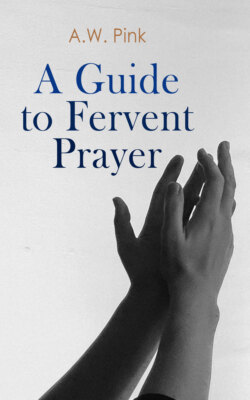Читать книгу A Guide to Fervent Prayer - A.W. Pink - Страница 30
На сайте Литреса книга снята с продажи.
Through the Blood of the Everlasting Covenant
ОглавлениеIn the last place, consider that the great act of God here spoken of is said to be "through the blood of the everlasting covenant." As to the exact meaning of these words there has been no little confusion in the minds of different writers on this Epistle; and while a full canvassing of this interesting question is really outside the scope of the present article, yet some of the more erudite of our readers would be displeased if we failed to make a few remarks thereon. So I shall ask others kindly to bear with me while I deal with a somewhat technical detail. A careful reading through of the Epistle to the Hebrews shows that mention is made therein of "the covenant" (10:29), "a better covenant" (8:6), "a new covenant" (8:8), and here to "the everlasting covenant." Not a few able men have concluded that reference is made to the same thing throughout, but with them I cannot agree. It is quite clear from Hebrews 8:6-13 that the new and better covenant made with the spiritual Israel and Judah (that is, the Church) stands in opposition to the first (v. 7) or old (v. 13) covenant made with the nation of Israel at Sinai (that is "Israel after the flesh"). In other words, the contrast is between Judaism and Christianity under two different covenants or economies, whereas "the everlasting covenant" is the antitheses of that covenant of works made with Adam as the federal head of the human race.
Though the covenant of works was first in manifestation, the everlasting covenant, or covenant of grace, was first in origination. In all things Christ must have the preeminence (Col. 1:18), and thus God entered into compact with Him before Adam was created. That compact has been variously designated as the "covenant of redemption" and the "covenant of grace." In it God made full arrangements and provisions for the salvation of His elect. That everlasting covenant has been administered, under different economies, throughout human history, the blessings of the same being bestowed on favored individuals all through the ages. Under the Old Covenant, or Judaism, the requirements and provisions of the everlasting covenant were typified or foreshadowed particularly by means of the moral and ceremonial law; under the New Covenant, or Christianity, its requirements and provisions are set forth and proclaimed in and by the Gospel. In every generation repentance, faith, and obedience have been required of those who would (and do) partake of its inestimable blessings (Isa. 55:3). In his Outlines of Theology, the renowned theologian A. A. Hodge says this:
The phrase "mediator of the covenant" is applied to Christ three times in the New Testament (Heb. 8:6; 9:15; 12:24), but as in each case the term for covenant is qualified by either the adjective "new" or "better," it evidently here is used to designate not the covenant of grace properly, but that new dispensation of that eternal covenant which Christ introduced in person in contrast with the less perfect administration of it which was instrumentally introduced by Moses.
